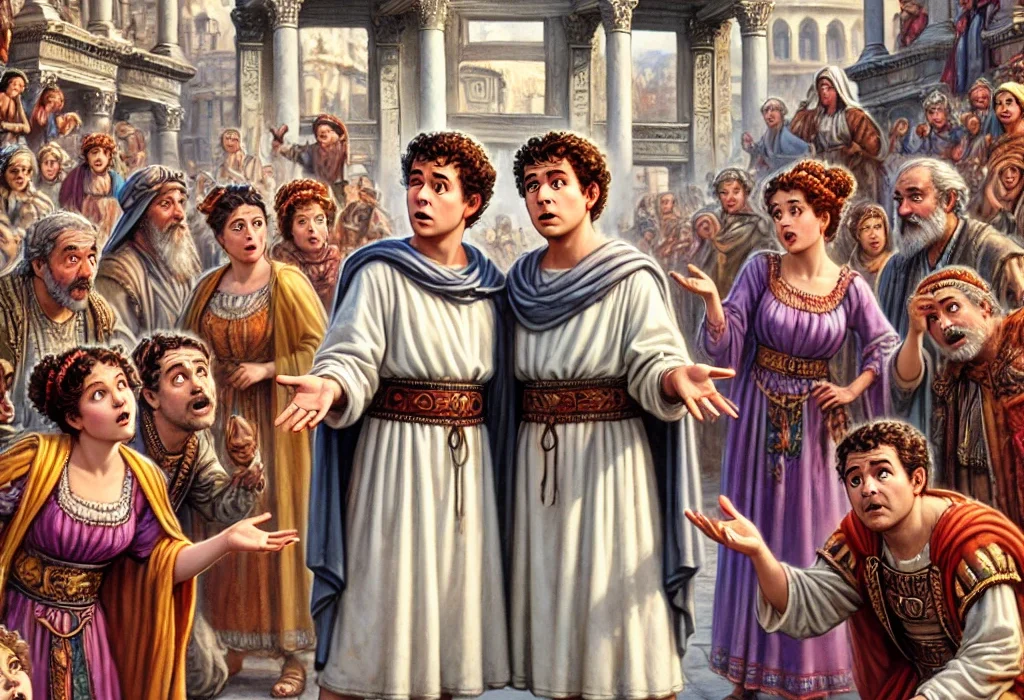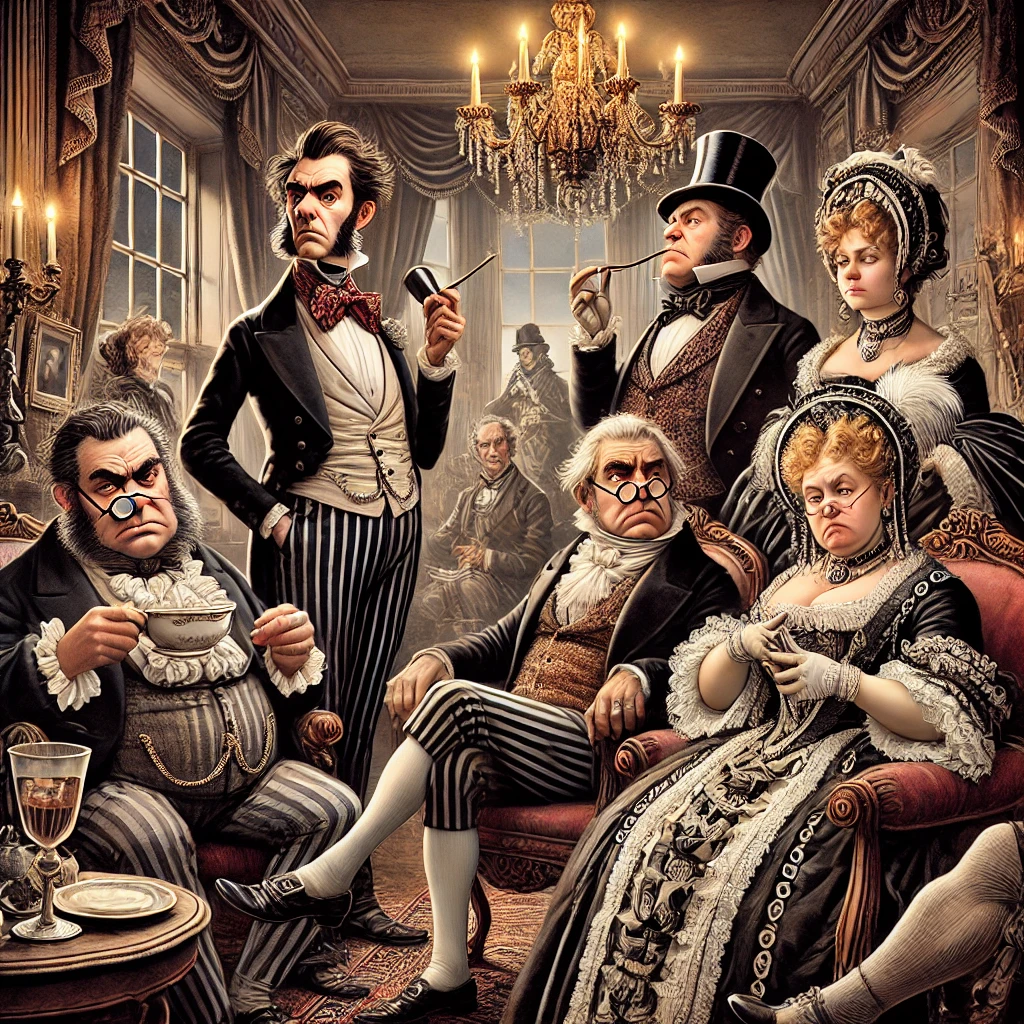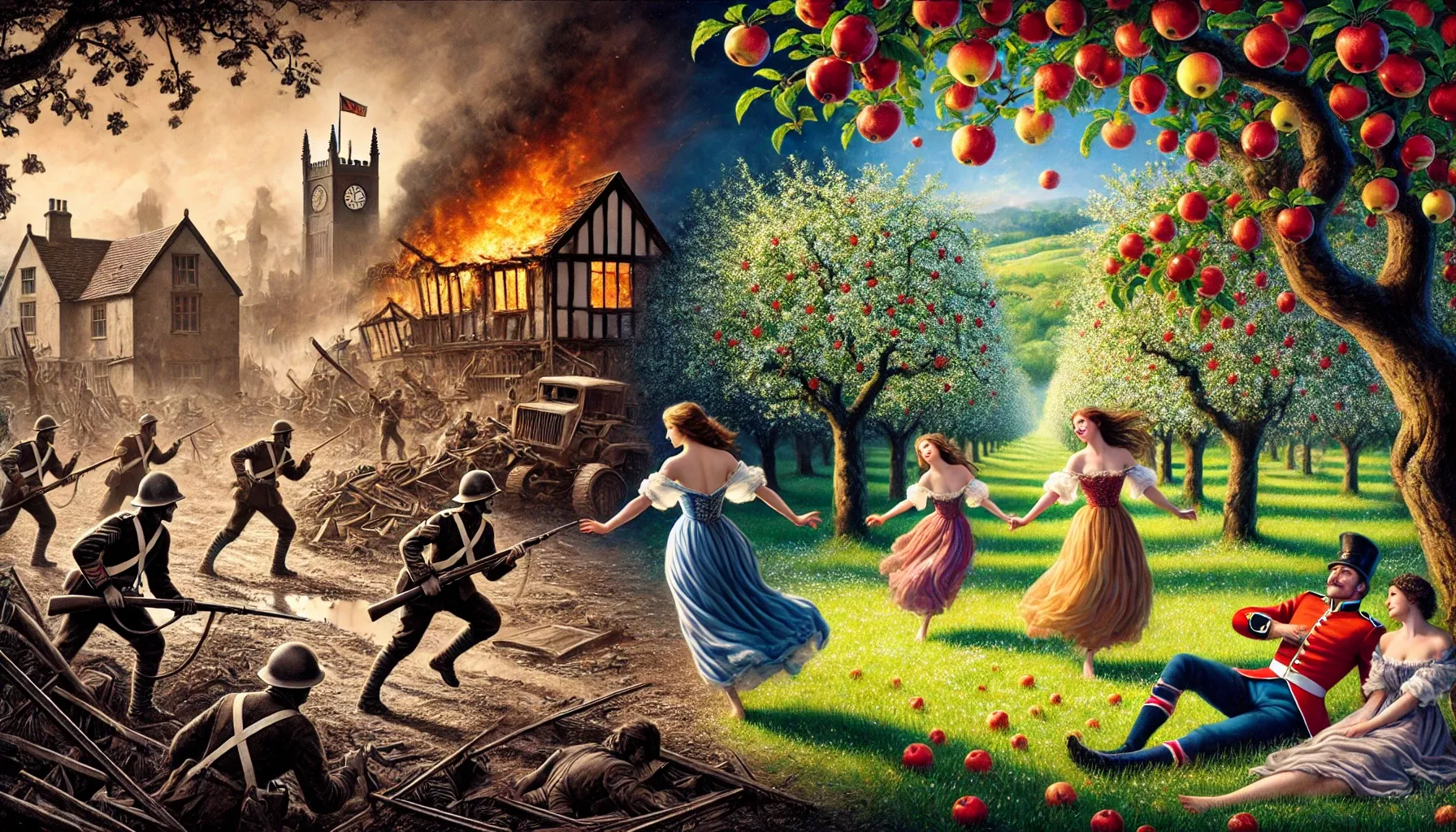The Comedy of Errors is a comedic play by William Shakespeare, first published in 1594, that explores themes of identity, family bonds, and the chaos wrought by chance. Set in the ancient city of Ephesus, the play follows two sets of twins who were separated at birth and inadvertently converge in the same city as adults, leading to a series of increasingly farcical events. It’s one of Shakespeare’s shortest and most lighthearted plays, showcasing his early use of wit and intricate plotting.
Plot Summary
In the bustling ancient city of Ephesus, a place famed for its strict laws against foreigners and its mystical air, the story unfolds with Aegeon, a merchant of Syracuse, who stands before the Duke of Ephesus. Aegeon is condemned to die unless he can pay a heavy ransom, for Ephesus is at odds with his homeland, and such are the laws for foreign merchants caught in the city. Yet Aegeon, weighed down by years of sorrow, seems almost indifferent to his fate. When questioned, he reveals a heartbreaking tale: many years ago, he had twin sons, both named Antipholus, and bought another set of twin boys, both named Dromio, as servants for each. Yet fate dealt a cruel hand when a storm at sea separated the family. His wife and one son, along with a servant, were taken from him, while he and the other son with a servant survived. Years passed, and the son who stayed with him grew restless, yearning to find his lost twin. Aegeon allowed him to set off on this quest, but he has yet to return. Now, driven by hope that has turned to despair, Aegeon himself journeyed to Ephesus in search of both sons, only to find himself imprisoned for his trouble.
Unbeknownst to Aegeon, his lost sons have both arrived in Ephesus at the same time, though they remain oblivious to each other’s presence. Antipholus of Syracuse, accompanied by his servant Dromio of Syracuse, arrives in the city, keen on exploring its markets and marvels. He is forewarned of the city’s disdain for Syracusians and decides to keep a low profile. Yet, as he wanders through the streets, strange events begin to occur: a local merchant addresses him as if they are well acquainted, and soon Dromio of Ephesus—the servant of his twin brother—encounters him, urging him to return home for dinner. Bewildered, Antipholus of Syracuse chastises Dromio for the nonsense and dismisses him, convinced that his servant is playing some elaborate prank. When he later finds his own servant, Dromio of Syracuse, he scolds him for the mischief, but Dromio protests his innocence, deepening the confusion.
Meanwhile, Antipholus of Ephesus, the twin living in the city, finds his own day disrupted. His wife, Adriana, grows increasingly anxious, frustrated by his absence and his strange behavior, which she interprets as inattentiveness or worse, infidelity. When Dromio of Ephesus describes the encounter with the man he assumed to be his master, Adriana assumes her husband is avoiding her and orders Dromio to fetch him home. Antipholus of Syracuse, mistaken for his brother, is brought to Adriana’s house, where she welcomes him with open arms. Startled yet intrigued, Antipholus goes along with the situation, dining with Adriana and enjoying her attentions. The baffled Dromio of Syracuse is equally perplexed by the cook, Nell, who insists she is his fiancée. The brothers’ unintended deceptions deepen as the mistaken identities continue, leaving each wondering about the peculiarities of Ephesus.
The chaos intensifies as Antipholus of Ephesus returns to his home with friends and finds himself barred entry by Dromio of Syracuse, who has been instructed by Adriana to let no one disturb her dinner with her ‘husband.’ Enraged by the locked doors and his own servant’s apparent insolence, Antipholus of Ephesus threatens to break down his own door. Humiliated before his friends, he decides to seek revenge by dining with a courtesan and purchasing an elaborate gold chain, which he intends to give as a token of defiance against Adriana.
The chain itself soon becomes a symbol of the mounting confusion. Angelo, the goldsmith, delivers it to Antipholus of Syracuse by mistake. Bewildered by the gift, Antipholus of Syracuse accepts it but warns he has no intention of paying for something he did not request. Meanwhile, Angelo meets Antipholus of Ephesus later that day, demanding payment for the chain. Denied the money and accused of deception, Angelo insists on involving the law, and Antipholus of Ephesus is promptly arrested. Furious, he sends Dromio of Ephesus to fetch bail from Adriana.
Yet, Dromio of Syracuse arrives at Adriana’s house first and, upon being asked for the bail money, reports that Antipholus has been arrested. Adriana, already convinced that her husband has lost his senses, rushes to his side with the bail money in hand, eager to free him and make sense of the strange turn of events. Her attempts to reason with him, however, only add to his confusion and frustration. When he finally gains his freedom, he blames Adriana for orchestrating the chaos and swears to confront her publicly. Meanwhile, his brother, Antipholus of Syracuse, encounters Adriana’s sister Luciana, who has secretly admired him, unaware that he is not her sister’s husband. Emboldened by her kindness, he confesses his affection, causing Luciana to flee in embarrassment.
As evening approaches, the misunderstandings spiral into near-tragedy. Both sets of twins, now thoroughly exasperated, are pursued by various people they have unwittingly crossed, including Angelo, Adriana, and even the courtesan, who demands repayment for her services. The situation reaches its breaking point when the brothers and their servants seek refuge in the local abbey. Adriana and the Duke arrive, begging the abbess to release the supposedly mad men inside, but the abbess insists they remain within her care.
The Duke’s arrival brings Aegeon into the fray, who, facing his final moments, is given one last chance to find someone to pay his fine. In a twist of fate, Antipholus of Ephesus steps forward, recognizing Aegeon as his father. Moments later, Antipholus of Syracuse emerges from the abbey, and the two brothers finally meet face to face, each realizing the astonishing truth of their lives and the unintentional havoc they have caused. Joy sweeps through the assembled crowd as father and sons are at last reunited. Adriana and Luciana find solace, each comforted by the end of their marital and romantic confusions. The Duke, moved by Aegeon’s story and the family’s reunion, forgives the fine, allowing Aegeon to return home with his sons and their newly reconciled families.
As peace descends over Ephesus, the twins, reunited with their respective wives and masters, find themselves laughing over the misunderstandings of the day. What began as a tragedy of separation has transformed into a joyous reunion, celebrated by the families and the city alike.
Main Characters
Antipholus of Syracuse: One of the twin brothers separated at birth. He travels to Ephesus in search of his lost brother, unknowingly setting off a chain of comic misunderstandings. Antipholus of Syracuse is earnest, slightly melancholic, and confused by the strange events and mistaken identities around him.
Antipholus of Ephesus: The other twin, a resident of Ephesus, who is unaware of his brother’s existence. His wife, Adriana, is frustrated with his seemingly erratic behavior, which stems from being confused with his twin. He’s portrayed as headstrong and often baffled by the events that unfold.
Dromio of Syracuse: The faithful but bumbling servant to Antipholus of Syracuse. His comedic misunderstandings and physical humor add a slapstick element to the play as he frequently gets mistaken for his twin counterpart.
Dromio of Ephesus: The twin servant of Antipholus of Ephesus, equally confused by the mistaken identities. His exchanges with his master and the other Dromio fuel much of the humor and confusion in the play.
Adriana: The wife of Antipholus of Ephesus. She is a strong-willed woman, increasingly distraught over her husband’s unusual behavior, which she interprets as infidelity. Her frustration and jealousy add a dramatic layer to the misunderstandings.
Luciana: Adriana’s sister, who has a more traditional view of marriage and duty. She unwittingly becomes entangled in the confusion, mistaking Antipholus of Syracuse for her brother-in-law, which leads to her receiving a romantic declaration that further complicates matters.
Theme
Mistaken Identity and Confusion: Central to the play, the theme of mistaken identity drives the comedy and plot, highlighting the fragile nature of perception and self-understanding.
Family and Reunion: Beyond the humor, the play is also about the reunion of a family long separated. This theme of reunion underscores the emotional undercurrents and the joy of discovering lost familial connections.
Social Order and Chaos: The mix-ups among characters challenge social norms and relationships, reflecting how order and identity can be disrupted by external forces. Ephesus becomes a space of chaos that is only resolved through revelation and recognition.
Love and Fidelity: Through Adriana’s suspicion of infidelity and Antipholus’ behavior, the play touches on the complexities of marriage and trust within romantic relationships.
Writing Style and Tone
Shakespeare’s language in The Comedy of Errors is marked by wit, puns, and a lively, rhythmic quality. The use of wordplay is not only humorous but also serves to deepen the misunderstandings between characters, amplifying the confusion and setting the stage for comedic absurdity. The dialogue is rapid and filled with clever exchanges, especially between the two sets of twins, emphasizing the play’s light-hearted, energetic tone.
The tone is humorous and farcical, embracing elements of slapstick and situational comedy. Shakespeare leans heavily on visual gags and physical comedy, making it accessible to audiences through exaggerated misunderstandings and mistaken identity. Despite the humorous tone, a sentimental note lingers due to the play’s conclusion, which brings resolution to the family’s years-long separation. The style showcases Shakespeare’s early skill in crafting lively, engaging dialogue and his deft ability to balance humor with moments of emotional depth.
We hope this summary has sparked your interest and would appreciate you following Celsius 233 on social media:
There’s a treasure trove of other fascinating book summaries waiting for you. Check out our collection of stories that inspire, thrill, and provoke thought, just like this one by checking out the Book Shelf or the Library
Remember, while our summaries capture the essence, they can never replace the full experience of reading the book. If this summary intrigued you, consider diving into the complete story – buy the book and immerse yourself in the author’s original work.
If you want to request a book summary, click here.
When Saurabh is not working/watching football/reading books/traveling, you can reach him via Twitter/X, LinkedIn, or Threads
Restart reading!








